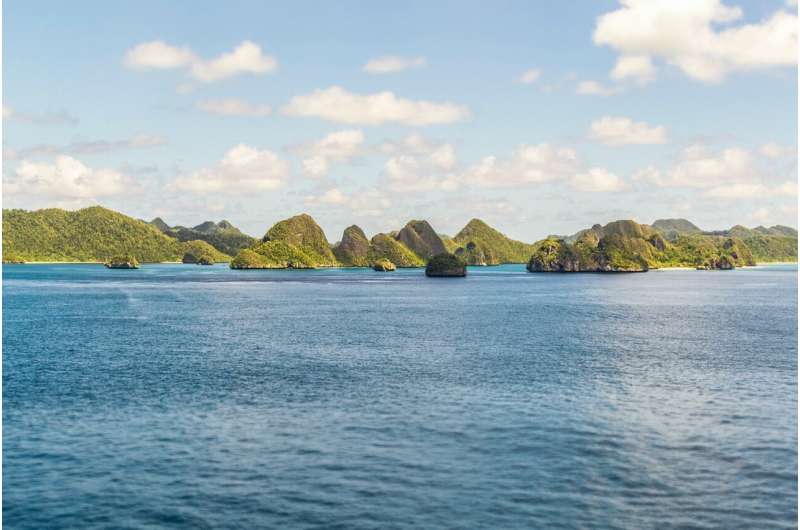This article has been reviewed according to Science X's editorial process and policies. Editors have highlighted the following attributes while ensuring the content's credibility:
fact-checked
trusted source
proofread
New ND-GAIN data shines spotlight on small islands' climate vulnerability and adaptation efforts

"We will not sign our death certificate," said Toeolesulusulu Cedric Schuster at the United Nations Climate Change Conference (COP28) last week, calling for a clear commitment to phasing out fossil fuels.
Schuster was representing the Alliance of Small Island States and drawing attention to the fact that rising sea levels, tropical storms, droughts and dwindling freshwater supplies pose existential threats to life on many small islands around the world.
Despite these vulnerabilities, islands often have little influence in shaping major climate resolutions. But researchers at the University of Notre Dame say there is something that could lend islands more influence: data.
"We have lots of data on the vulnerability and preparedness of wealthy nations with highly developed infrastructure," said Danielle Wood, director of the Notre Dame Global Adaptation Initiative (ND-GAIN) and an associate professor of the practice in Notre Dame's College of Engineering. "But having routine data collection is expensive. Low-income countries are usually data scarce, with islands often lacking the resources to collect it. What this means is that we often have the most information on the countries likely to be the least impacted."
Wood pointed out that the lack of data can deepen existing disparities and create a vicious cycle. "Many small islands contribute a negligible amount to greenhouse gas emissions, but we quite often don't have a clear picture of where the most critical vulnerabilities lie or how the situation might worsen without action. That lack of data can discourage investment on the part of governments and philanthropists—including the investments that would help collect better data," she said.
ND-GAIN is a signature climate change adaptation tool that has long been central to conversations at COP and other climate change conferences. Updated annually, ND-GAIN's Country Index ranks more than 180 nations according to how vulnerable they are to climate change and how prepared they are to deal with climate change's effects.
Until this year, measurements specific to islands were largely absent from ND-GAIN. This year's update, however, includes data on Nauru, Palau and the Marshall Islands. It also includes updated vulnerability indicators that reflect the core concerns of islands, such as how dependent the country is on imported energy.
"Before the recent addition of these islands, we have routinely received questions about data for islands and representation in ND-GAIN," said Brian Wanbaugh, program manager for ND-GAIN.
"This update is a step in the right direction," Wood cautioned, "but it helps make the case that the data needs to be part of a larger conversation about justice in climate adaptation."
Camile Cleveland, a policy manager at Hua Nani Partners, which relies on ND-GAIN in its climate policy, strategy and advocacy efforts, welcomed the updates.
"Donors and agencies are very data-driven. Without solid evidence, it's tough to make a case for funding, and this data will help show why islands need attention and investment," Cleveland said. "And although all islands are vulnerable to climate impacts, they are vulnerable in different ways; we need a clearer picture of who is most at risk now."
Cleveland also emphasizes that we should see islands not just as vulnerable places on the "front lines" of climate change but also as leaders developing innovative solutions to climate adaptation.
"Island communities were thriving on their own for centuries before colonizers reached their shores, so they have cultures and indigenous practices that reflect an impressive mastery of natural systems," Cleveland said. "These cultures combined with the need to adapt to climate impacts are leading to innovations that should be given more attention on the global stage."
The updated ND-GAIN Country Index is available to download at gain.nd.edu. Free and open source, the ND-GAIN Country Index helps decision-makers in governments, nongovernmental organizations, corporations and academia prioritize investments for a more efficient response to the global challenges ahead, such as overcrowding, food insecurity, inadequate infrastructure and civil conflicts.
ND-GAIN is a program within Notre Dame's Environmental Change Initiative, with more than 60 faculty across several disciplines pursuing research solutions for some of the key environmental challenges of our time.
Provided by University of Notre Dame





















